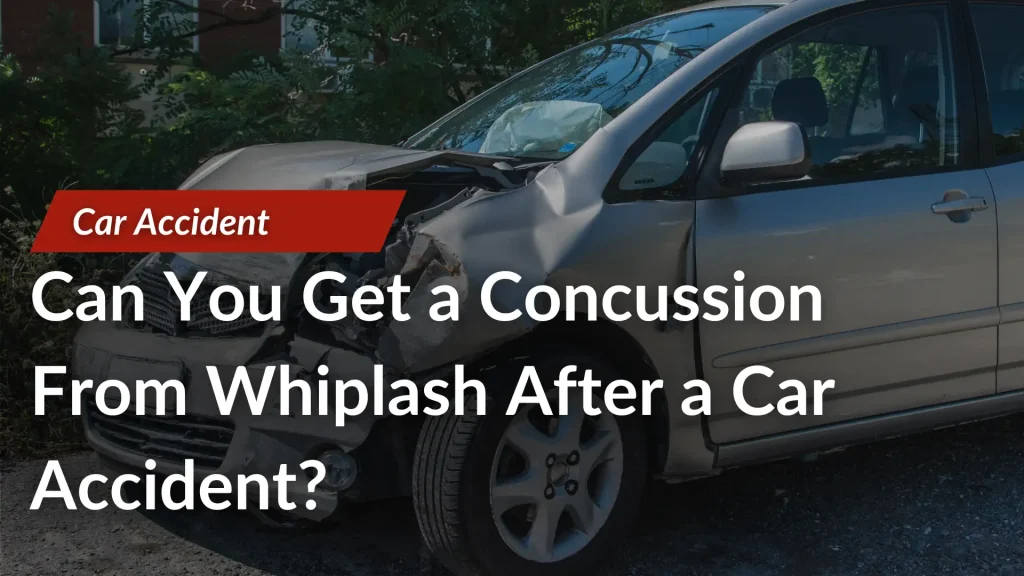
After a car accident, many people focus on visible injuries like cuts or broken bones, but what about the less obvious ones? Can you get a concussion from whiplash? The answer is yes. Whiplash, which occurs when the neck snaps back and forth suddenly, can cause enough force to injure the brain, leading to a concussion. Understanding the connection between these two injuries is crucial for accident victims seeking medical care and compensation.
What Is Whiplash?
Whiplash is a neck injury caused by rapid, forceful back-and-forth movement of the neck, similar to the cracking of a whip. It’s common in rear-end car accidents but can also occur in other types of collisions or physical trauma. Symptoms of whiplash often include:
- Neck pain and stiffness
- Limited range of motion
- Headaches, often starting at the base of the skull
- Shoulder or upper back pain
While whiplash primarily affects the neck, the sudden motion can also impact the brain. When the head jerks violently, the brain can strike the inside of the skull, potentially causing a concussion.
How Whiplash Can Lead to a Concussion
Concussions are a type of traumatic brain injury (TBI). They occur when the brain experiences a significant impact or jolt. During a car accident, the force of a collision can cause the head to whip forward and back, even if the head doesn’t make direct contact with a surface. This movement can result in the brain being shaken within the skull, leading to a concussion.
Victims of car accidents might not immediately connect their concussion symptoms to whiplash. That’s why seeking prompt medical attention is essential, even if you initially feel fine.
Recognizing Concussion Symptoms After a Car Accident
Concussions can present a wide range of symptoms, and these may appear immediately after the accident or take hours, even days, to develop. Common concussion symptoms include:
- Persistent headaches
- Dizziness or balance issues
- Nausea or vomiting
- Sensitivity to light and noise
- Difficulty concentrating or memory problems
- Fatigue or sleep disturbances
These symptoms can overlap with those of whiplash, making it even more important to get a comprehensive medical evaluation. If left untreated, a concussion can lead to more severe issues, including long-term effects.
Long-Term Effects of Concussions
While some concussions resolve within weeks, others can result in lingering complications. These long-term effects can disrupt a person’s daily life, career, and relationships. Potential long-term effects of concussions include:
- Chronic headaches or migraines
- Difficulty concentrating, often called “brain fog”
- Sensory sensitivity, such as heightened sensitivity to light or sound
- Emotional disturbances, including depression and anxiety
- Sleep disorders
In severe cases, repeated concussions or a single, poorly managed concussion can contribute to permanent brain damage. Understanding these risks underscores the importance of seeking appropriate medical care after an accident.
The Importance of Early Diagnosis and Treatment
Prompt diagnosis and treatment are critical when dealing with whiplash and concussions. Without proper care, these injuries can worsen over time, leading to chronic pain or cognitive impairments. Medical professionals use a combination of physical exams, imaging studies, and neurological evaluations to identify these conditions. Early intervention, including physical therapy, medication, and rest, can significantly improve recovery outcomes.
Ignoring symptoms or delaying medical attention could also harm your personal injury claim. Insurance companies often argue that gaps in treatment indicate your injuries aren’t serious. You protect your health and legal case by seeking care immediately and following your doctor’s recommendations.
If you’re unsure about what steps to take after an accident, consulting with an experienced Florida car accident attorney can help you through the process and avoid pitfalls that could jeopardize your recovery or settlement. A knowledgeable legal advocate helps ensure your voice is heard and your rights are protected.
Pursuing Compensation for Concussions After a Crash
If you’ve suffered a concussion and whiplash due to a car accident caused by someone else’s negligence, you may be entitled to compensation. Recovering from these injuries often involves significant medical expenses, missed time from work, and ongoing therapy. The types of compensation you could pursue include:
- Medical Expenses – This includes costs for emergency care, diagnostic tests, physical therapy, and follow-up appointments.
- Lost Income – If your injuries prevent you from working, you may be able to recover compensation for lost wages and diminished earning capacity.
- Pain and Suffering – This accounts for the physical pain and emotional distress caused by your injuries.
- Future Medical Care—Compensation may also cover the cost of ongoing treatment or rehabilitation for severe or long-lasting injuries.
A skilled personal injury attorney can help evaluate your case, gather evidence, and negotiate for the maximum settlement possible.
Whiplash and Concussion Settlement Considerations

When negotiating a settlement for injuries like whiplash and concussions, several factors come into play:
- Severity of Injuries – The extent of your injuries and their impact on your daily life will significantly influence the settlement amount.
- Medical Documentation – Detailed medical records that link your symptoms to the accident are essential.
- Liability – Proving the other party’s fault is crucial to your claim.
- Insurance Coverage – The at-fault party’s insurance policy limits can also affect the settlement.
Insurance companies often try to minimize payouts, questioning the severity of injuries like whiplash and concussions. Having an experienced attorney advocate for you helps protect your rights and improves your likelihood of recovering fair compensation.
Steps to Take After a Car Accident
If you believe you may have suffered whiplash or a concussion after an accident, taking the right steps can strengthen your claim and safeguard your recovery:
- Seek Medical Attention Immediately – Even if symptoms are mild, see a healthcare provider to document your injuries.
- Follow Your Doctor’s Recommendations – This demonstrates your commitment to recovery and provides valuable evidence for your claim.
- Document the Accident—Take photos of the scene, collect witness information, and, if possible, file a police report.
- Contact a Personal Injury Lawyer – An attorney can help you understand the legal process, gather evidence, and negotiate with insurance companies.
Get the Help You Deserve
Dealing with injuries like whiplash and concussions can be overwhelming. If you’ve been hurt in a car accident, our Florida car accident attorney can help you pursue the compensation you deserve. Our team fights tirelessly for accident victims to get them the medical care and financial support they need to recover fully. We proudly service Tampa, Florida, and San Diego, Mission Valley, and Carlsbad, CA.
Contact Jurewitz Law Group Injury & Accident Lawyers today at (619) 233-5020 or message us online for a free consultation. There’s no risk to you — we only get paid if we win your case.
Related Posts:
Top Tips for Speaking to Your Doctor After Your Car Accident
How To Dispute Car Accident Fault
Emotional Distress in California Personal Injury Lawsuits
Automobile Insurers Don’t Want to Pay Your (Full) Medical Bills


